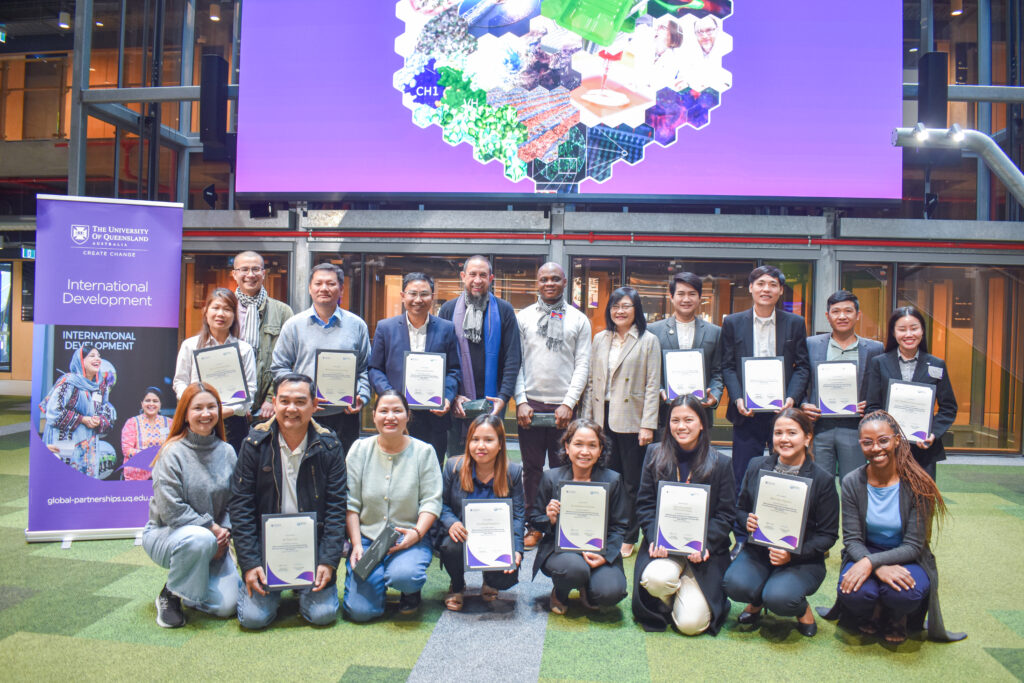Mekong Institute (MI) partnered with the University of Queensland (UQ) to deliver a Study Visit Course in Australia on Advancing Climate-Smart Agriculture (CSA) across the Value Chain, held from June 3 to June 8, 2024. This program was designed to facilitate knowledge exchange between the Lower Mekong Countries and Australia for adaptable strategies that will enhance the promotion of CSA practices in Cambodia, Lao PDR, Thailand, and Vietnam.
“This program offers a unique opportunity for you to learn from the successful implementation of CSA here in Queensland. This state encompasses a diverse range of agricultural environments that closely parallel the climatic and ecological conditions of the Mekong region, which makes it an ideal location to provide you with relevant and transferable insights into CSA practices,” said Ms. Maria Theresa S. Medialdia, Director of Agricultural Development and Commercialization Department, Mekong Institute during her opening remarks.
The Mekong delegation was welcomed by Ms. Dallas Dowsett, Head of International Development in UQ. In her message, she expressed her hope that the prepared program can provide participants with perspectives into innovative practices and technologies that can be adapted and implemented in their respective countries.
Mr. Shayne Mckenna, First Secretary (Development) at the Australian Embassy in Bangkok, shared the same enthusiasm and encouraged participants to take advantage of the study visit to broaden their understanding of the various CSA initiatives being implemented in Australia. He emphasized the Australian Government’s commitment to supporting the Mekong subregion in building environmental resilience through the Mekong Australia Partnership – Water, Energy, and Climate Change (MAP-WEC).
The week-long study visit covered multiple locations in Queensland, including Brisbane, Stradbroke Island, Gatton, Toowoomba, and Warwick. The participants engaged in a variety of activities aimed at gaining a thorough understanding of Australia’s implementation of CSA technologies. They interacted with experts and key stakeholders on sustainable landscape management, innovative agricultural technologies, renewable energy integration in agriculture, and sustainable livestock management.
After being presented with government initiatives on CSA, the delegation explored the Minjerribah to learn more about the traditional ecological knowledge of Quandamooka people and the climate change mitigation efforts at the UQ Moreton Bay Research Station. The visit to the UQ Gatton Campus included demonstrations of drone technology in precision farming and tours of state-of-the-art greenhouse and animal science facilities. In Warwick, participants examined the UQ Solar Farm’s renewable energy applications in agriculture, and discussed climate-smart practices in vegetable production at private farms.
Dr. Ammar Aziz, School Director and Higher Degree Research Leader at the School of Agriculture and Food Sustainability at the UQ, and the Course Leader of the Study Visit, introduced the Systems Thinking Approach to addressing climate change. By integrating Systems Thinking, the participants engaged in group exercises to analyze and identify effective CSA strategies and develop a comprehensive understanding that goes beyond isolated practices.
This study visit course was part of the MI and DFAT joint project on Promoting Climate-Smart Agriculture Technologies and Innovations in Lower Mekong Countries under the MAP-WEC.








